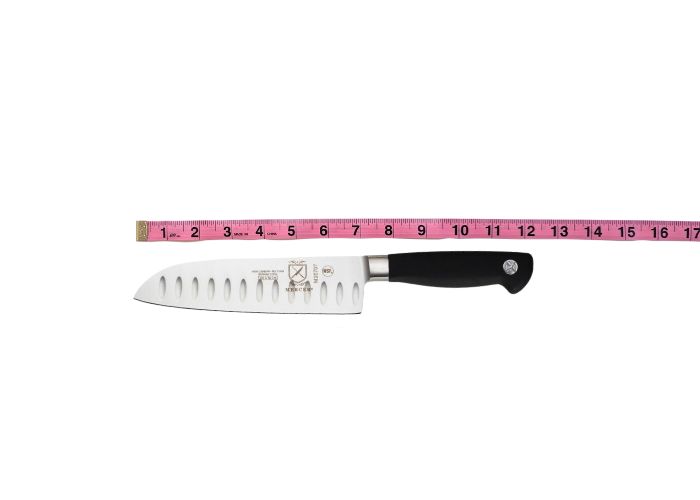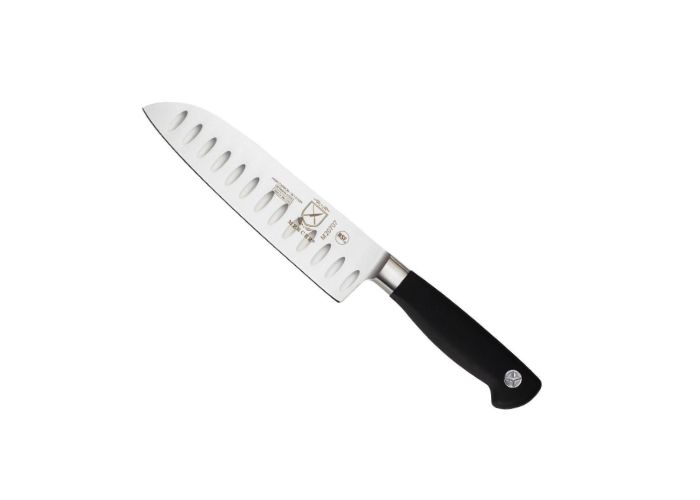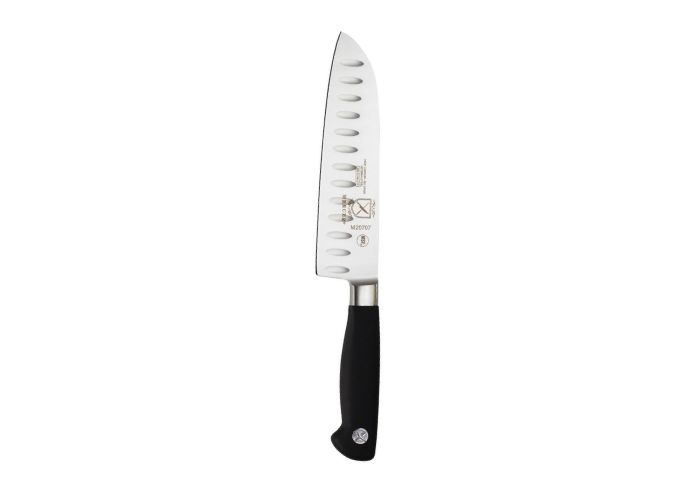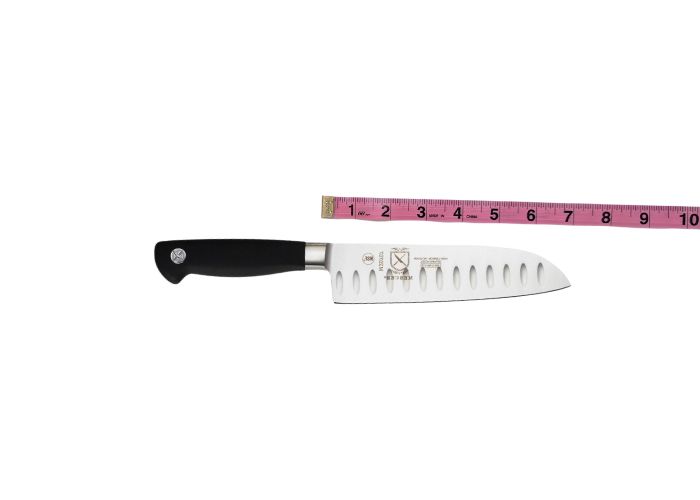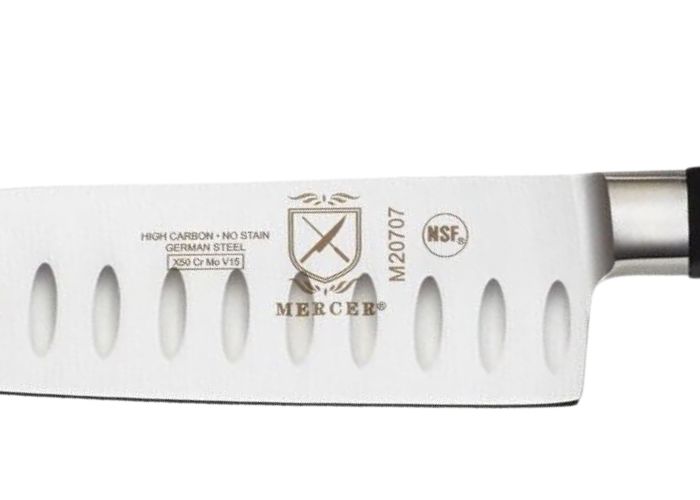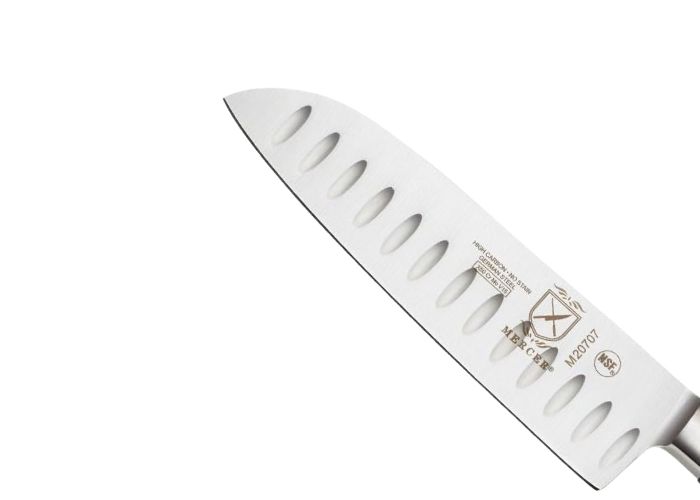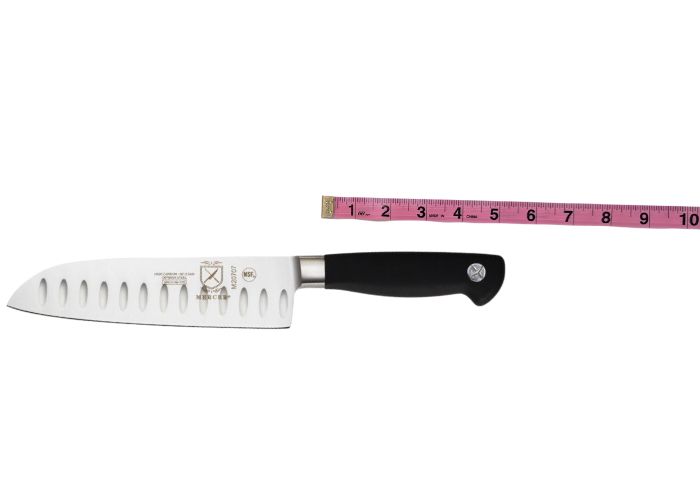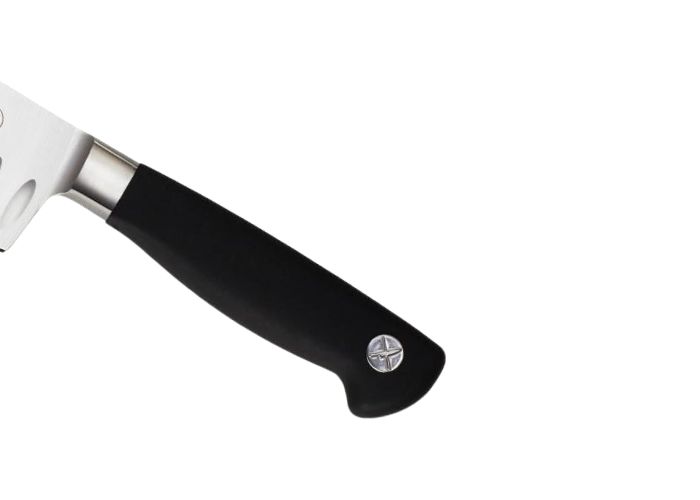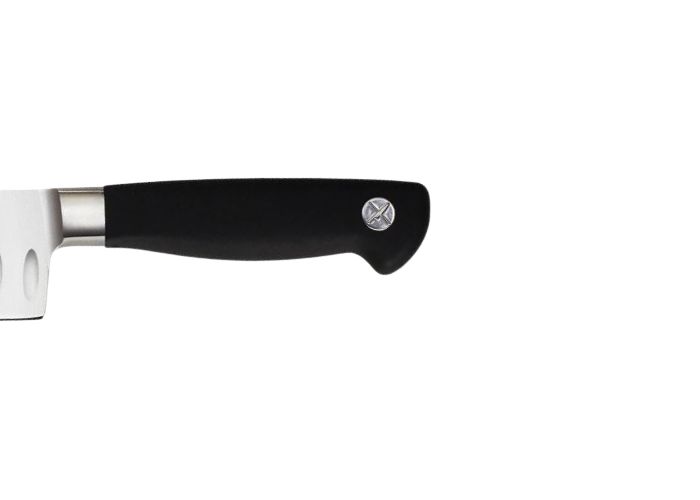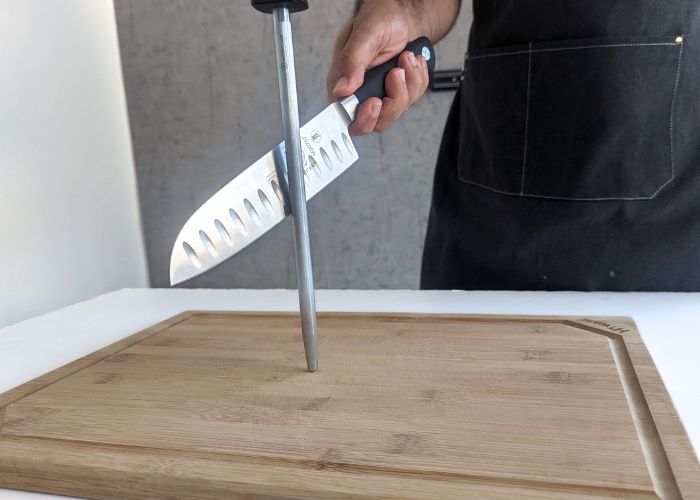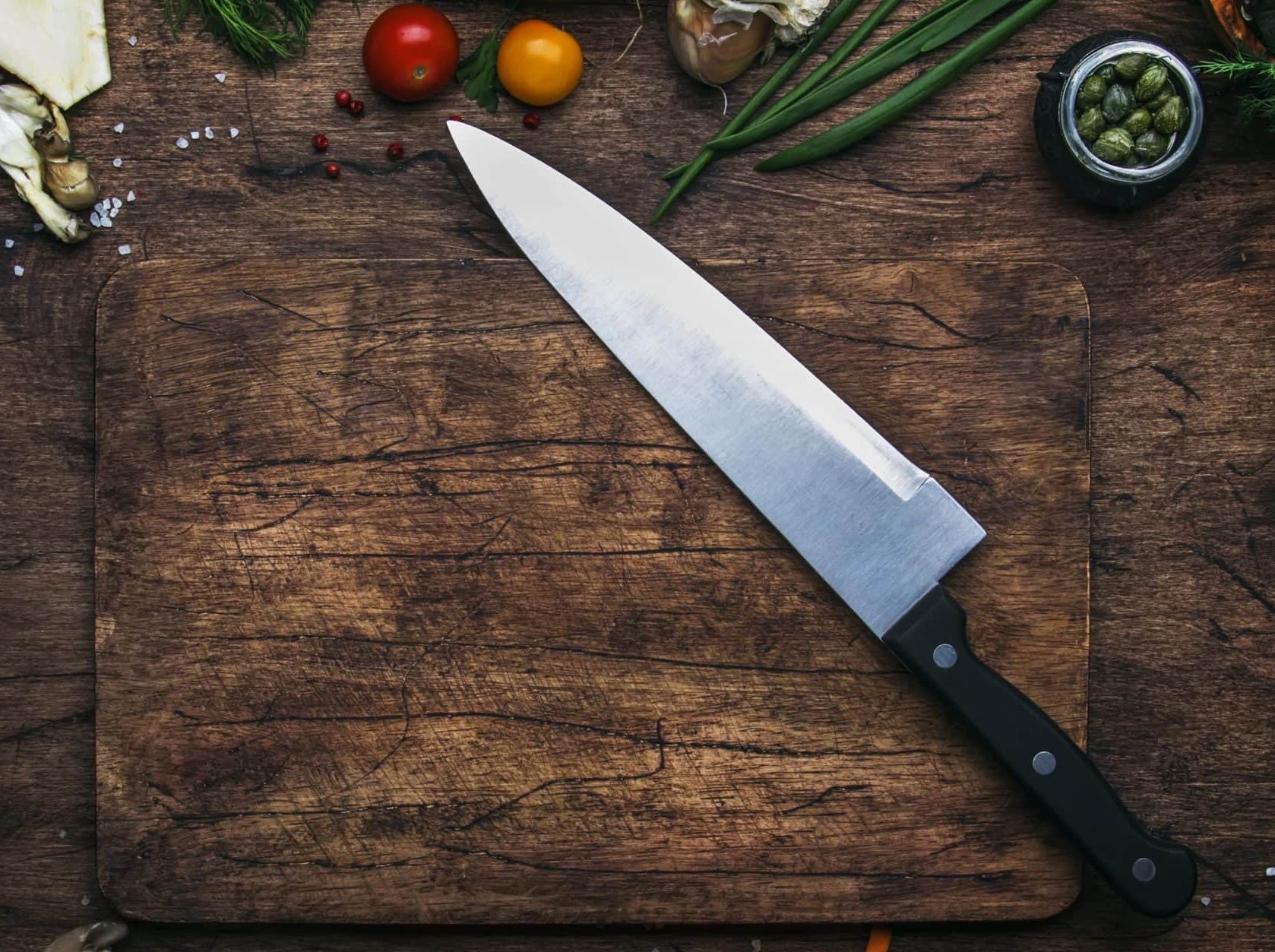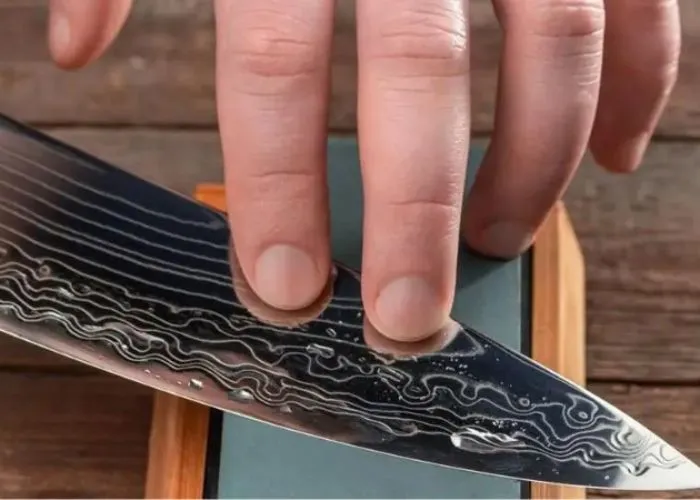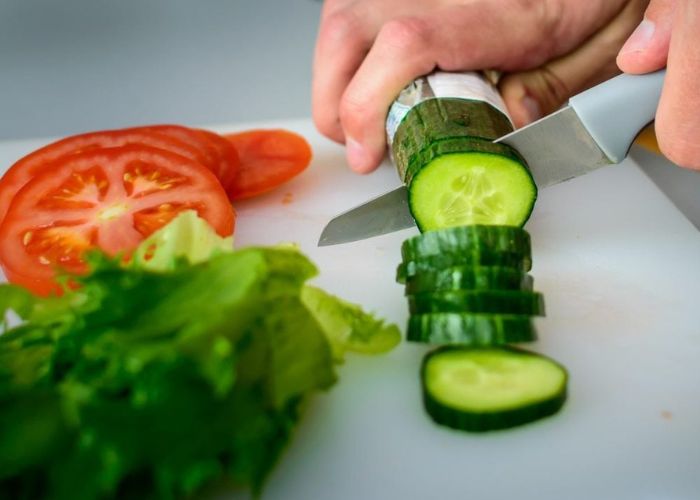Reviewed by Knives Academy team, Based on Methodology v 1.0
- Brand - Mercer Culinary
- Collection - Genesis
- Model - M20707
- Manufacture Country - Taiwan
Introducing the Mercer Culinary Genesis 7-inch Santoku Chef Knife, model M20707, a Western German-style chef knife from the esteemed brand Mercer Culinary. Crafted in Taiwan, this knife is part of their Genesis collection, combining traditional craftsmanship with modern functionality. With its high carbon stainless steel blade and Santoprene handle, it’s tailored for those who value simplicity, durability, and versatility in their culinary tasks. Priced at approximately $47, it offers excellent value for its performance and quality.
THE BOTTOM LINE
With the Mercer Culinary Genesis 7-inch Santoku Chef Knife, model M20707, what you get is a reliable and versatile tool that offers a good balance between value, functionality, and maintenance. It offers a reliable and sturdy knife, with decent versatility – making it suitable for a variety of tasks, from chopping, dicing, and mincing, while still being able to tackle most delicate and heavy-duty work.
All in all, it offers very good leverage and dexterity, the handle provides a comfortable grip and excellent control, and its balance is very good, reducing hand and wrist fatigue during extended use.
Despite its shortcomings, which mainly lie in its acceptable sharpness and edge retention (which also contribute to a lesser safety experience), and the less luxurious feel of handling the knife, the Mercer Culinary Genesis 7-inch Santoku Chef Knife offers great value for its price, making it a great first knife and a reliable tool for any kitchen.
PRICE: From 47$
THE GOOD
- Reliable
- Mostly versatile
- Easy maintenance (excluding edge retention and restoration)
- Great value for money
THE BAD
- Acceptable sharpness and edge retention
- Sharpening takes some effort
INTENDED AUDIENCE
- Beginners
- Casual home cooks
- Professional kitchens that use frequent sharpening services
BEST USED FOR
- Chopping, dicing, mincing
GET TO KNOW THE KNIFE
KNIFE SPECIFICATIONS & VISUAL INSPECTION
DIMENSIONS
Knife Attribute | Imperial | Metric |
|---|---|---|
Knife Length | 12.20 inches | 30.98 cm |
Knife Weight | 7.4 ounces | 209.78 g |
Blade Length | 7 inches | 17.78 cm |
Blade Heel Length | 1.89 inches | 4.8 cm |
Handle Length | 5.2 inches | 13.2 cm |
CONSTRUCTION
Knife Attribute | Value | Knife Forging Method | Forged |
|---|---|
Knife Tang Type | Hidden tang |
Hardness (HRC) | 56 |
Blade Material | High carbon stainless steel |
Blade Steel Grade | X50CrMoV15 |
Blade Finish | Hand Polished |
Blade Geometry Grind | Flat |
Blade Grind Angle | 15 |
Blade Bevels | Double |
Handle Material | Santoprene |
UNBOXING
THE KNIFE
The Mercer Culinary Genesis 7-inch Santoku Chef Knife, model M20707, is a Western German-style chef knife that embodies a blend of simplicity and functionality. This forged knife, featuring a hidden tang, weighs a comfortable 7.4 ounces and measures 12.2 inches in length. The knife is designed with a half bolster, contributing to its balanced feel. It’s crafted to be versatile, catering to right- and left-handed users. Additionally, it meets the standards of the National Sanitation Foundation (NSF), ensuring its suitability for professional kitchen use.
THE BLADE
The blade of the Mercer Culinary Genesis 7-inch Santoku Chef Knife is crafted from high-carbon stainless steel, specifically X50CrMoV15, known for its durability and resistance to corrosion. With a Rockwell hardness rating of 56, the blade strikes a decent balance between hardness and toughness (but one which leans more into toughness). The blade measures exactly 7 inches in length, with a spine width of 2mm, and features a straight spine shape with a distal taper towards the tip. The cutting edge is a flat grind with a double bevel, set at an angle of 15 degrees.
In terms of aesthetics, the blade features a silver color and is polished to a satin finish, which gives it a sleek and modern look. The blade’s face bears the Mercer Culinary logo, adding a touch of brand recognition to its design. The blade also features Granton dimples, which are common in Santoku-style knives and are designed to prevent food from sticking to the blade during use.
THE HANDLE
The Mercer Culinary Genesis 7-inch Santoku Chef Knife features a Santoprene handle, a material known for its durability and resistance to moisture. The handle measures 5.2 inches long and is contoured with a straight profile, providing a comfortable grip for extended use. The handle is black, offering a classic contrast to the silver blade. It features the Mercer Culinary logo, subtly embossed on the handle. The handle does not have any rivets, focusing on a sleek design rather than additional safety features. The butt of the handle features a small handle guard, enhancing safety during use.
KNIVES ACADEMY TESTING
PERFORMANCE
The Mercer Culinary Genesis 7-inch Santoku Chef Knife offers an acceptable cutting performance. Both sharpness and edge retention were found to be acceptable by our testers. Although this is probably the knife’s weakest metric, the knife does a good job of balancing performance with other metrics – specifically maintenance and functionality. This is probably by design, considering its build properties – its 56 HRC which indicates a softer blade, its 15-degree blade angle which is a balancing point between sharpness and durability, its blade thickness and standard flat grind.
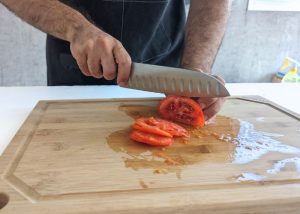
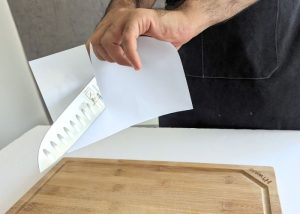
SHARPNESS
In our testing, the knife exhibited an acceptable level of sharpness, successfully cutting through both paper and a soft tomato, albeit not with razor-like precision. This degree of sharpness aligns with the knife’s properties that contribute to its sharpness.
EDGE RETENTION
Our testers found the knife to have demonstrated acceptable edge retention, maintaining its sharpness even after intensive two weeks of usage without any sharpening. But it is safe to say that the knife’s edge retention is not as long-lasting as those with a higher hardness rating, a thinner edge, or a lower edge angle.
FUNCTIONALITY & VERSATILITY
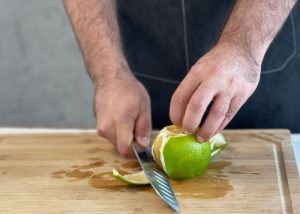
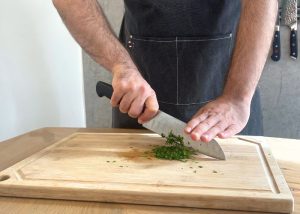
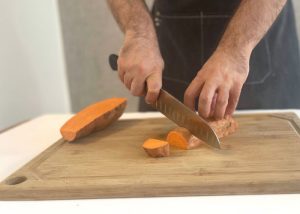
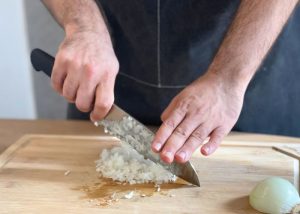
TECHNIQUE VERSATILITY
The Mercer Culinary Genesis 7-inch Santoku Chef Knife demonstrated a very good level of versatility in our tests. It excelled in chopping, dicing, and mincing tasks, and was very good in slicing and carving. Its ability to tackle more delicate tasks such as peeling, turning, deseeding, trimming, and filleting was acceptable.
The knife excelled in heavy-duty tasks like butchering, cleaving, and breaking down dense and tough ingredients. Its up-down chopping motion was excellent, and its rocking motion was very good. Given its performance, this knife is best suited for everyday tasks that require robustness and strength, while also being somewhat capable of handling more delicate tasks if required to.
STRENGTH, TOUGHNESS & DURABILITY
Our testers found the knife to have showcased excellent strength, toughness, and durability in our tests. The knife is admittedly strong and durable, and it proved to be reliable and resilient, handling a variety of tasks with ease, and efficiency when dealing with hard ingredients. The blade’s 15-degree angle and Rockwell hardness rating of 56, which is on the softer side, contribute to its durability.
LEVERAGE
Our testers found the Mercer Culinary Genesis 7-inch Santoku Chef Knife to have showcased very good leverage in our tests. The knife is notably efficient in transferring force during cutting tasks, and it proved to be effective in handling a variety of cutting tasks without applying too much effort or force. The knife’s relative heaviness and strength, along with its forged construction, are the primary contributors to its leverage. Despite its hidden tang build, which is typically seen as a detractor to leverage, it doesn’t seem to negatively impact the knife’s leverage in this case.
DEXTERITY & MANEUVERABILITY
Our testers found the Mercer Culinary Genesis 7-inch Santoku Chef Knife to have showcased very good dexterity and acceptable maneuverability in our tests. The knife’s 7-inch blade length and flat grind contribute to its dexterity, allowing for precise cuts. However, the knife’s relative heaviness and slightly wider blade may slightly hinder its maneuverability during changes in cutting directions. The blade’s 15-degree angle and distal taper further enhance its dexterity, making it efficient for intricate tasks. The knife’s relative thickness may slightly decrease its dexterity.
FLEXIBILITY / RIGIDITY
Our testers found the Mercer Culinary Genesis 7-inch Santoku Chef Knife to lean towards rigidity during our tests. Its Rockwell hardness rating of 56 suggests a softer balanced blade hardness, yet the blade felt notably harder. This rigidity proved beneficial for heavy-duty tasks, such as chopping through dense vegetables, with the blade maintaining its course without deviation. However, its flexibility was rated as very poor, suggesting it may not be the best choice for more delicate tasks like peeling and filleting, where some flexibility is required.
FEEL & EXPERIENCE
Overall, the Mercer Culinary Genesis 7-inch Santoku Chef Knife offers a very good user experience. The contoured Santoprene handle provides a comfortable grip, although the material may not feel as premium to some users. The knife excels in grip stability and control, with the partial bolster and handle guard on the butt enhancing the overall grip. The knife’s balance is very good, particularly in the handshake/thumb grip and fingertip grip tests, but it leans towards being handle-heavy in a pinch grip. Despite its meaningful weight, the knife is acceptable in minimizing hand and wrist fatigue during extended use, making it suitable for prolonged use.
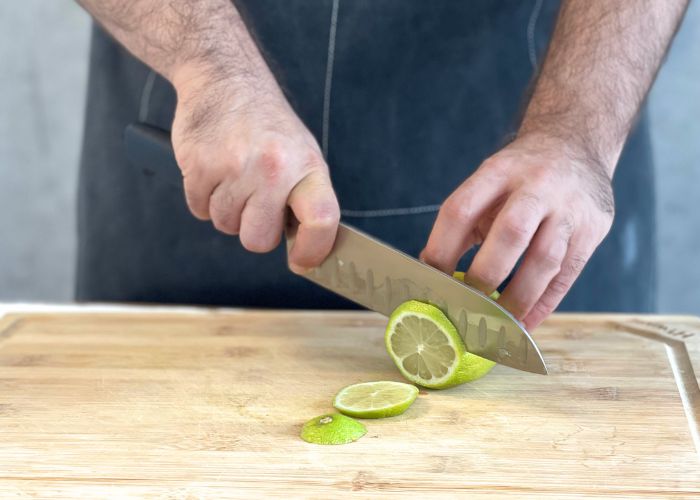
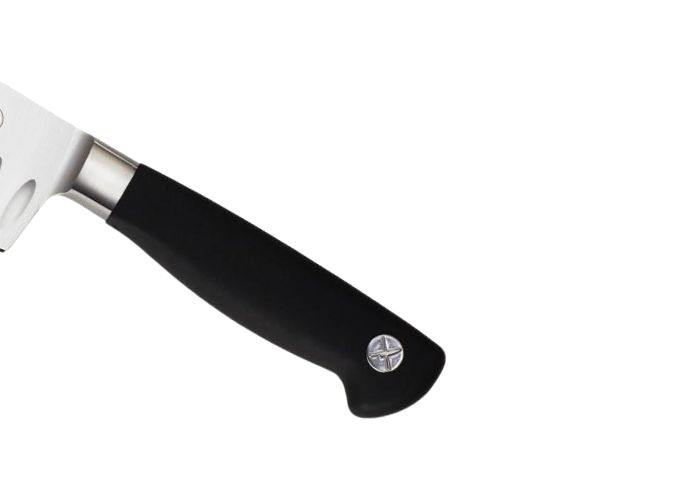
COMFORT & ERGONOMICS
The Mercer Culinary Genesis 7-inch Santoku Chef Knife offers acceptable comfort and ergonomics. The handle, made of Santoprene, is contoured and smooth, providing a comfortable grip. The handle’s length will probably fit most hand sizes. However, the Santoprene material, while durable and moisture-resistant, may not feel as premium or comfortable to some wielders. Additionally, the short distance between the handle and the blade could prove less comfortable for some.
GRIP STABILITY & CONTROL
Our testers found the knife to have demonstrated excellent grip stability and control in our tests. The contoured Santoprene handle, combined with the half bolster, provides a secure and stable grip, preventing slippage or unintended rotation during use. The good handle-to-blade proportions offer additional control. The handle’s smooth texture and the knife’s balanced albeit heavier weight further contributes to its excellent grip stability and control. The presence of a handle guard on the butt enhances the overall grip, providing better palm support.
BALANCE
Our testers found the knife to have demonstrated very good balance in our tests. The knife shined in both the handshake/thumb grip and fingertip grip tests, where the balance point was centered, earning an outstanding balance score in both instances.
However, when held in a pinch grip, the balance point was a bit handle-heavy (surprising considering its hidden tang build) and resulted in an average balance score. This means that you may feel the knife’s weight shift more towards the handle when chopping, which you may want to take into account if you prefer using the pinch grip.
FATIGUE
Our testers found the Mercer Culinary Genesis 7-inch Santoku Chef Knife to be acceptable in minimizing hand and wrist fatigue during extended use. Despite its forged construction and weight of 7.4 ounces, the knife’s other design properties help to reduce strain over time. The 7-inch blade length is well-balanced, which aids in fatigue reduction. The choice of a partial bolster (rather than a full one) also contributes to lesser levels of fatigue. Overall, the knife is suitable for prolonged use without causing undue strain on the user’s hand and wrist, despite its weight.
MAINTENANCE
The Mercer Culinary Genesis 7-inch Santoku Chef Knife offers an overall very good maintenance profile, mainly driven but its ability to resist corrosion, rust, scratches, structural damage, and chipping. There is a bit more maintenance involved as far as edge retention and restoration go. You won’t have to worry about babying it, but sharpening probably will have to happen at closer intervals than other knives.
CORROSION & RUST RESISTANCE
Our testers found the knife to have demonstrated excellent resistance to corrosion and rust in our saltwater spray tests. This suggests that the knife’s inherent resistance properties due to its material, hardness, and finish are highly effective, even under prolonged exposure to corrosive elements. However, it’s important to note that regular maintenance and proper care are still essential to maintain this level of resistance and keep the knife in optimal condition.
STRENGTH, TOUGHNESS & DURABILITY
The Mercer Culinary Genesis 7-inch Santoku Chef Knife demonstrated excellent strength, toughness, and durability in our tests, contributing to its low-maintenance appeal. The knife’s weight, forged construction, and high carbon X50CrMoV15 stainless steel material enhance its toughness. The knife maintains its structural integrity well, which will aid in reducing the need for frequent repairs or replacements.
WEAR, TEAR & SCRATCH RESISTANCE
The Mercer Culinary Genesis 7-inch Santoku Chef Knife demonstrated excellent resistance to wear, tear, and scratches in our tests. While there are some very small signs of scratches that were observed near the edge of the knife, this was after extensive and rather careless use, indicating that the knife has some decent resistance properties. Regular maintenance and proper care are therefore essential to maintain its appearance and prolong its lifespan.
EDGE RETENTION
The knife’s edge retention was found to be acceptable in our tests. The knife retention is naturally a little compromised due to the knife’s lower hardness, edge thickness, and blade angle. This means that while the knife can maintain its cutting edge over time with regular honing and care, it may require more frequent sharpening than some other knives. This should be a consideration for those who prefer a lower-maintenance knife in terms of edge sharpening.
EDGE RESTORATION (EASE OF SHARPENING)
The knife’s edge restoration was found to be average in our tests. The results align with our expectations, considering the knife’s construction and characteristics, as well as our prior experience with wear and tear assessments. Although the sharpening process of the knife is very straightforward, achieving a finely resharpened edge demands a certain amount of time and effort.
SAFETY
The Mercer Culinary Genesis 7-inch Santoku Chef Knife is acceptable in terms of safety. It is equipped with several noteworthy safety features. The half bolster and handle guard on the butt provides a buffer between the hand and the blade, enhancing safety. The contoured Santoprene handle ensures a secure grip, while the blade’s heel width and curved choil shape increase knuckle clearance, reducing the likelihood of accidental contact with the cutting edge.
However, the knife lacks a finger guard or a full bolster which could further enhance safety. In addition, the heel of the blade is close to the handle, which decreases finger clearance. Despite these factors, the knife’s safety features contribute to a secure and comfortable cutting experience, but caution should still be exercised.
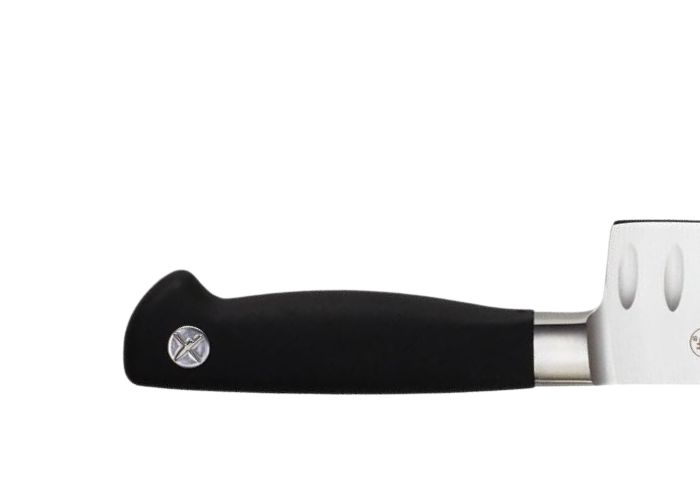
VALUE ESTIMATION
The Mercer Culinary Genesis 7-inch Santoku Chef Knife, priced at around $47, offers a good balance of quality and affordability. The knife’s high carbon X50CrMoV15 stainless steel blade, known for its balance between durability and ease of maintenance, and the full tang design, which is typically found in higher quality knives, contribute to its value estimation. The blade’s polished finish and distal taper, which require more labor and craftsmanship, further enhance its worth. The knife’s handle is made of Santoprene, a durable and comfortable material.
There are, however, some elements that devalue the overall value estimation of the knife. The knife’s tang is hidden, which is usually a lesser choice in terms of construction and quality. The Santoprene handle, while comfortable and durable, might feel cheap to some users. The build quality, specifically around the handle, is not as refined as in higher-grade Mercer Culinary knives, with small crevices and unrefined finishes.
Despite these drawbacks, considering the knife’s overall very good performance in most of our tests, particularly in terms of maintenance and functionality, and its very attractive price tag make this knife a great value-for-the-money choice.

